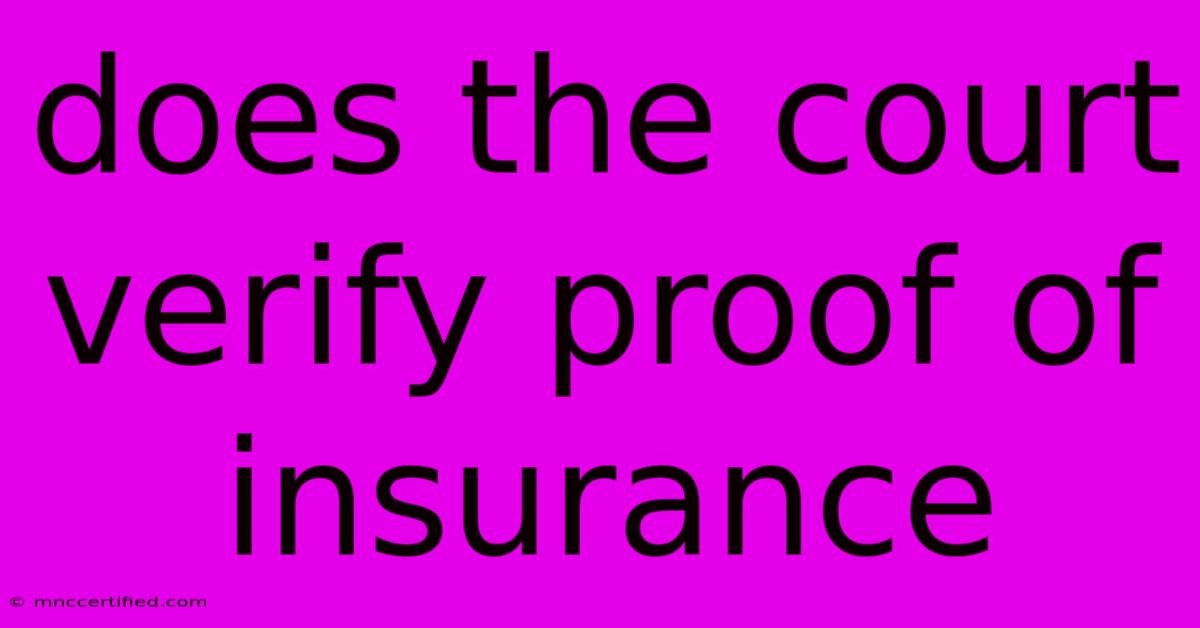Does The Court Verify Proof Of Insurance

Table of Contents
Does the Court Verify Proof of Insurance?
It's a question that pops up frequently when dealing with legal matters: does the court actually verify proof of insurance? The answer, unfortunately, isn't a simple yes or no. It depends on the specific situation and jurisdiction.
Here's a breakdown to help you understand:
Understanding the Importance of Proof of Insurance
Proof of insurance is crucial for several reasons, particularly in cases involving car accidents or other incidents where liability is a concern. Here's why:
- Financial Protection: It ensures that injured parties have access to compensation for medical bills, property damage, and other related expenses.
- Legal Compliance: Many states mandate drivers to carry insurance, and failure to do so can result in fines, license suspension, or even jail time.
- Peace of Mind: Having proof of insurance provides a sense of security, knowing that you're covered in the event of an accident.
When Does the Court Verify Proof of Insurance?
The court's role in verifying proof of insurance varies depending on the context:
- During a Traffic Stop: Police officers typically request proof of insurance during traffic stops. They may check the validity of the insurance policy through a database or by contacting the insurance company directly.
- After an Accident: If a car accident occurs, the police report will often include information about insurance coverage. This information may be used by the court during any subsequent legal proceedings.
- Civil Lawsuits: In cases where a lawsuit arises from an accident, the court may require parties to provide proof of insurance as part of the discovery process. This helps determine the extent of coverage and potential financial resources available.
The Court's Role in Verification
While the court may not actively verify proof of insurance in every instance, it's crucial to remember that:
- Falsifying Proof of Insurance is a Crime: Providing false or misleading information about insurance can lead to serious legal repercussions, including criminal charges.
- Insurance Claims Process: It's ultimately the insurance company that processes claims and determines coverage. The court plays a role in overseeing the legal aspects of disputes, but the verification process is typically handled by the insurer.
What to Do if You're Involved in an Accident
Here are some key steps to take if you're involved in a car accident:
- Contact the Police: Report the accident to the authorities.
- Exchange Information: Get the other driver's contact information, insurance details, and vehicle information.
- Take Pictures: Document the accident scene with photos and videos.
- Contact Your Insurance Company: Notify your insurer about the accident and follow their instructions.
Conclusion
While the court may not directly verify proof of insurance in all situations, it plays an important role in overseeing legal proceedings related to accidents and insurance disputes. It's crucial to understand the importance of having valid insurance and providing accurate information during any legal interactions. If you're involved in an accident, follow the proper steps to protect yourself and ensure your rights are protected.

Thank you for visiting our website wich cover about Does The Court Verify Proof Of Insurance. We hope the information provided has been useful to you. Feel free to contact us if you have any questions or need further assistance. See you next time and dont miss to bookmark.
Featured Posts
-
Kimmel Chokes Up On Trump Win
Nov 08, 2024
-
Starbucks Holiday Drinks Food And Cups Arrive
Nov 08, 2024
-
Chelsea Vs Noah Conference League Live Stream Guide
Nov 08, 2024
-
How Much Does Hrt Cost Without Insurance
Nov 08, 2024
-
Property And Casualty Insurance Software
Nov 08, 2024